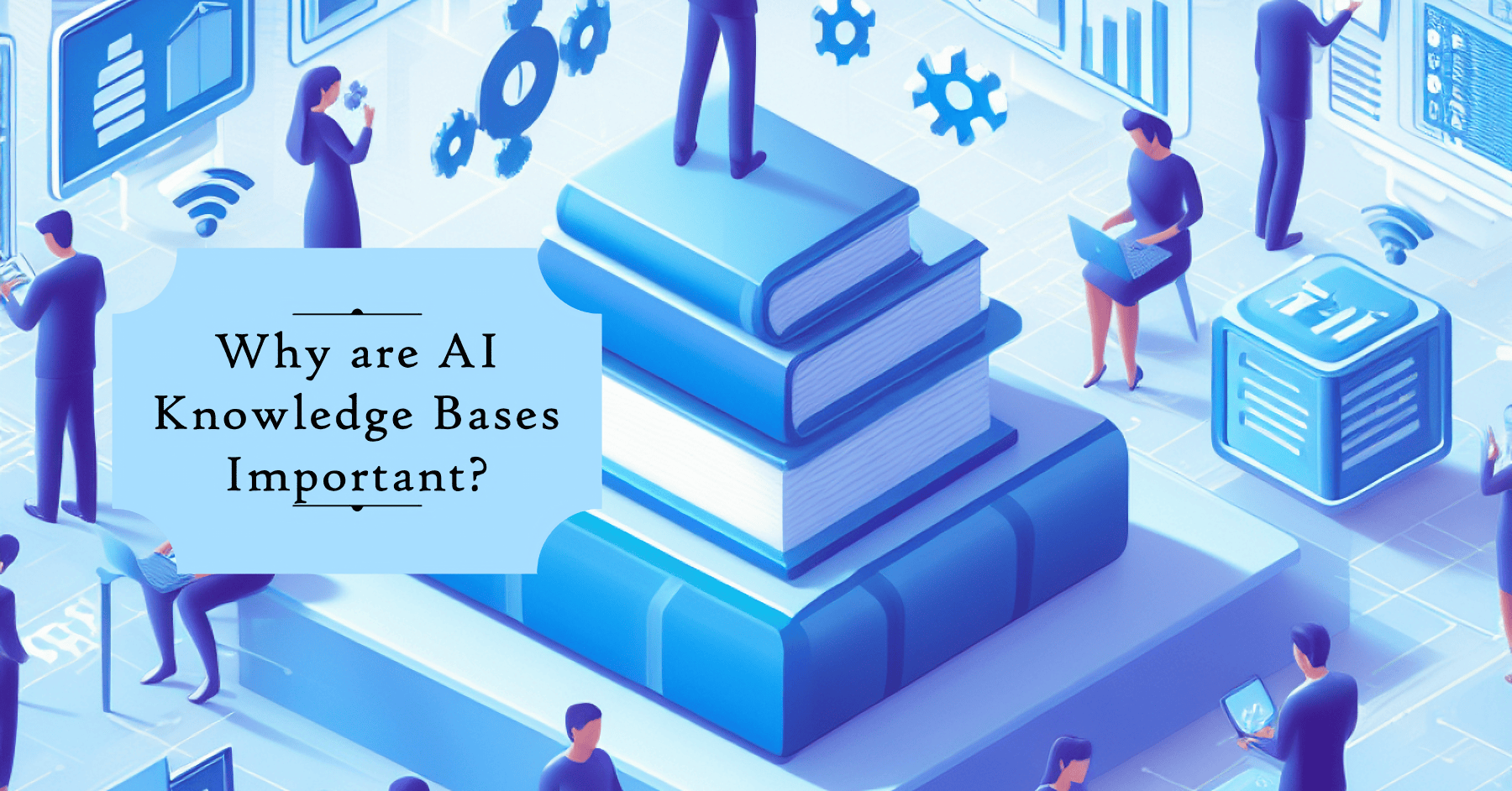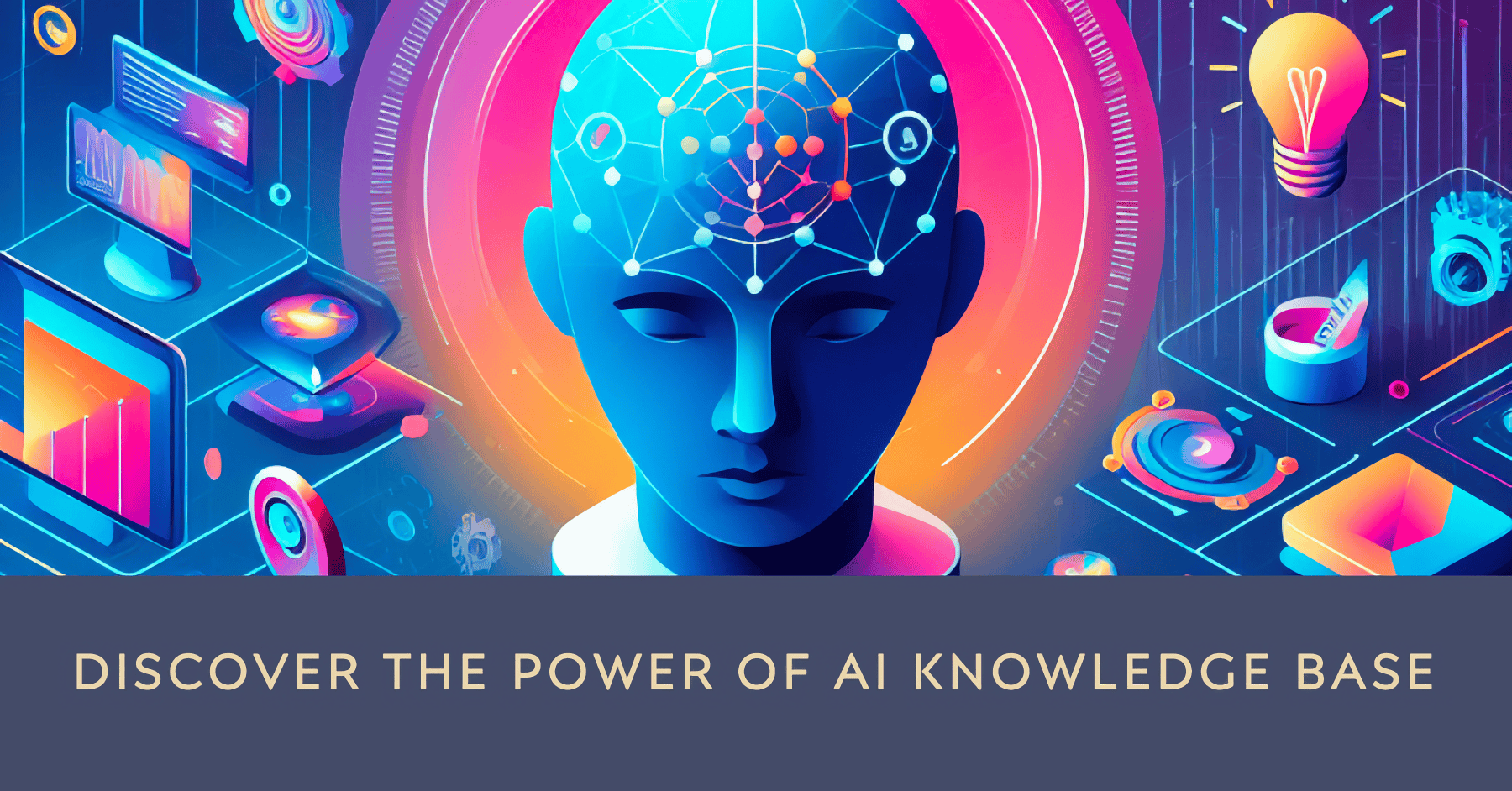Artificial intelligence (AI) is transforming businesses across every industry. As companies increasingly adopt emerging technologies like machine learning and natural language processing, AI knowledge bases have become essential for remaining competitive in the digital landscape.
Implementing an AI-powered knowledge base can significantly enhance customer service capabilities, streamline business operations, and bolster data-driven decision-making. This comprehensive guide explores everything today organizations need to know about leveraging AI knowledge bases to achieve transformative results.
What are AI Knowledge Bases?
AI knowledge bases are sophisticated data repositories optimized by artificial intelligence algorithms. They store, organize, analyze, and retrieve both structured and unstructured information to deliver automated and personalized responses to customer inquiries in real time.
Unlike traditional knowledge bases that rely solely on manual data input, management, and search functionalities, AI knowledge bases harness the power of machine learning to continuously enrich their capabilities. As new information enters the knowledge base, the AI extracts key data points, establishes connections across other data sets, and develops a deeper understanding of underlying contexts and patterns.
This allows AI knowledge bases to support natural language interactions, understand user intent, and provide intelligent recommendations tailored to customers unique needs and contexts. With their ability to learn, adapt, and improve over time, AI knowledge bases are truly transformative for enhancing self-service options and scaling human expertise.
Key Capabilities
Capability | Description |
|---|---|
Natural Language Processing | Parses queries and understands user intent |
Automated Reasoning | Provides recommendations and decision support |
Sentiment Analysis | Gains deeper insights into customer perceptions |
Predictive Modeling | Forecasts outcomes based on historical interactions |
Personalization Engines | Tailors responses to individual contexts |
Table 1: Key capabilities of AI knowledge bases

Why are AI Knowledge Bases Important?
AI knowledge bases address several pressing pain points for modern enterprises:
Soaring Customer Expectations
Today's consumers expect instantaneous responses and personalized interactions across every touchpoint. Meeting these lofty expectations is extremely challenging without the right use of enabling technologies. AI knowledge bases allow companies to provide consistent 24/7 support while understanding nuances in customer questions to enhance satisfaction.
Need to Scale Expertise
Although human agents strive to offer exceptional service, variability exists across representatives as some may be more knowledgeable than others. AI knowledge bases democratize access to high-quality service by codifying institutional knowledge so that every customer benefits from the same baseline of expertise.
Data Overload
The explosion of multichannel customer conversations across an endless array of platforms makes harnessing insights exceptionally difficult. By aggregating both structured and unstructured data into a unified resource, AI knowledge bases unlock tremendous value from previously disconnected information sources.
Transition to Self-Service
Customers increasingly prefer self-service for the promise of quick, customizable support accessible on-demand. AI knowledge bases fulfill these expectations in a cost-effective manner while still maintaining rigorous oversight over quality.
Pain Point | Description |
|---|---|
Soaring Customer Expectations | Consumers expect real-time, personalized support |
Scaling Human Expertise | Reduce variability across agents |
Data Overload | Unify insights across disconnected systems |
Transition to Self-Service | Meet demand for DIY options |
Table 2: Importance of AI knowledge bases
Implementing AI knowledge bases empowers companies to rise to the moment and deliver top-tier customer experiences amid a rapidly evolving digital landscape.
To enrich their knowledge repositories, some platforms are exploring integrations with cutting-edge solutions like the AI personal assistants profiled on Ingest AI's overview to provide users with conversational self-service options that feel more natural and contextual. Though still emerging for enterprise knowledge bases, advances in chatbots and voice assistants showcase the widening capabilities of AI to enhance engagement.

Creating an AI Knowledge Base: Key Steps
Deploying an AI knowledge base involves bringing together a structured repository of high-quality information with intelligent algorithms capable of understanding natural language queries. Critical steps include:
1. Compiling Relevant Information
A strong foundation requires aggregating three information sources into a unified platform:
Explicit Expert Knowledge: The most valuable information comes directly from subject matter experts across the business. Concepts, processes, and best practices should be codified into playbooks, guidelines, and FAQs.
Existing Conversations: Valuable tribal knowledge already exists in exchanges between customers and human agents. These conversations should be ingested to identify trends.
External Sources: Curate industry reports, news sources, social media forums, and other external outlets to stay updated on the latest developments and conversations.
2. Establishing Governance
Content must be subject to rigorous oversight to ensure high quality, consistency, and accuracy throughout the knowledge base lifecycle. Governance establishes authoring standards, coordinates cross-functional reviews, and sets policies for maintenance.
3. Enabling Automated Updates
New information enters an enterprise from multiple avenues every single day. Automated alerting and analysis functionalities allow relevant insights to flow seamlessly into knowledge bases without any manual intervention.
4. Building an AI Layer
Sophisticated machine learning algorithms extract connections, identify trends, and continually enhance how queries are mapped to the right responses over time. Natural language processing facilitates conversational interactions.
5. Integrating Across Platforms
Unify data from an AI knowledge base into customer-facing applications ranging from virtual assistants to support portals for streamlined self-service options. CRM workflows also improve as agents leverage recommendations.
Infrastructure and Integration
Powering an intelligent knowledge base requires integrating sophisticated AI algorithms into existing systems:
Natural Language Processing (NLP): Components like Microsoft's Azure OpenAI or MonkeyLearn analyze unstructured text to understand context and user intent.
Search Infrastructure: Vector databases underpin robust search functionalities, with options Azure Cognitive Search providing strong out-of-box capabilities.
Integrations: Tying AI knowledge base platforms into forums, customer support portals, CRM systems pulls data while embedding intelligent assistance where employees already work.
Establishing robust integrations, nurturing machine learning models with quality data, and leveraging affordable cloud infrastructure delivers an enterprise-grade foundation for AI knowledge bases.
Real-World Impact: Tangible Outcomes
Industry leaders across retail, technology, financial services, and healthcare have already achieved remarkable success from AI knowledge bases:
"We've increased first-contact resolution by 15% and lowered case escalation rates by over 20% after implementing our AI knowledge base." - Director, Customer Support Operations, Fortune 500 Retailer
"Our machine learning algorithms comb through millions of technical support documents, user forums, manuals, and logs to provide engineers with perfectly tailored coding examples and error fixes." - VP of Software Development, Leading Tech Company
"By analyzing past claims data and legal doctrines, our AI knowledge graph cuts document review timelines by a staggering 30-40% helping us manage litigation costs." - General Counsel, Multinational Insurance Provider
"Patient symptom checks, lab diagnostics, drug specifications and latest clinical guidelines are available instantly for doctors across our network thanks to machine learning models properly classifying reams of medical information." - Chief Medical Information Officer, Prominent Hospital
Thought leaders predict even more dramatic results as knowledge bases leverage emergent capabilities like personalization engines, chatbots with emotional intelligence, automated workflow enhancements, real-time alerting, and voice-enabled self-service.
Performance metrics and evaluation
Tracking key metrics helps assess how well the AI system functions and informs data-driven optimization. Crucial knowledge base metrics include:
Contact rate versus knowledge base visits: Compare ratios to gauge whether documentation addresses customer needs. Higher self-service traffic reduces contacts.
Conversations resolved on first contact: Quantifies accessibility by measuring single-touch resolutions using knowledge base content.
Failed searches: Monitoring unsuccessful queries reveals content gaps to upgrade for better search performance.
In addition, metrics like first call resolution, average handle time, and customer satisfaction prove invaluable for quantifying knowledge base impact across service teams. Setting targets for these KPIs and analyzing trends demonstrates where AI knowledge bases elevate agent productivity and the customer experience.
Key Takeaways
AI knowledge bases represent a strategic capability for managing soaring customer expectations, scaling expertise, harnessing data, and facilitating seamless self-service in the digital era. By curating enterprise-wide information, applying intelligent algorithms, and integrating across customer-facing applications, businesses can achieve transformative outcomes ranging from improved satisfaction to consistent service delivery across every interaction.
Now is the time for forward-thinking companies to explore AI knowledge bases if they haven't already, as competitors leverage these innovations, shifting consumer preferences demand them, and the technology landscape continues advancing at a relentless pace.


